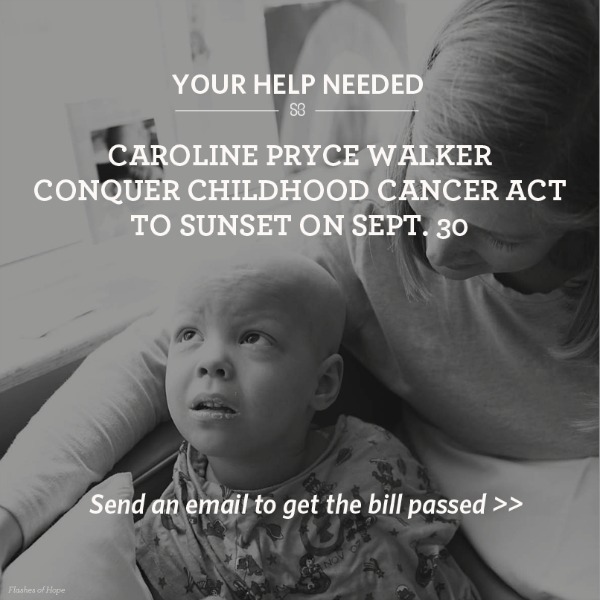We do this hoping our elected officials will understand why supporting sustainable funding for childhood cancer research is so important and how new legislation can help overcome the barriers to the advances in clinical care that children so desperately need in order to survive.
Last week, when I attended the Congressional Childhood Cancer Caucus meeting with St. Baldrick’s CEO Kathleen Ruddy and Senior Director of Advocacy Lisa Parks, I went to listen.
We heard about how legislative initiatives the childhood cancer advocates supported in the past few years, like the Creating Hope Act, are already producing results, encouraging drug development specifically for kids with rare diseases, including cancers. More than a few researchers, members of Congress, and parent advocates voiced agreement that when it comes to your own child being diagnosed, the idea that the designation of his or her disease as “rare” is used to justify few or no known available curative treatment options comes as insult upon injury. Every child’s life is equally as important, no matter what the name of the disease.
We heard about current bills before Congress, such as the Caroline Pryce Walker Conquer Childhood Cancer Reauthorization Act, which has three points of focus:
- It will help researchers improve upon how we survey and track kids with different forms of cancer.
- It will also allow researchers to work together to explore other barriers to the development of new pediatric cancer drugs.
- Finally, this bill designates funds for pediatric bio-banking, critical to enabling researchers to use the new technological and analytical tools that have been developed in the past 5 – 10 years effectively, as well as those that will be available in the near future.
This bill has not gained enough cosponsors to be considered for voting as of yet. The Caroline Pryce Walker Conquer Childhood Cancer Reauthorization Act would expand the number of bio-repositories, the facilities which collect and store the tissue and tumor samples needed for research.
We have much more work to do, and we could use more help.
Dr. Peter Adamson, chair of the Children’s Oncology Group, the nation’s largest cooperative research group for kids with cancer, voiced his strong support for the bill, stating that it is “essential now…to the future of our children.” He noted that passage of this bill would support highly qualified technicians responsible for storing well-annotated bio-specimens, ensuring they are handled properly, and providing data that can be studied by researchers around the world. This will help us focus on all childhood cancers and has the potential to “unlock the secrets to what is driving the cancer” in each child.
We heard not only about the myriad ways that corporate initiatives and non-profit foundations including St. Baldrick’s are working together to help bridge the funding gap, but also how the recent cuts in federal investment via the budget sequester have gravely impacted researchers’ efforts.
In separate meetings, we learned about ways we can help foster collaboration between the FDA, CDC, pharmaceutical industry, and the pediatric oncologists who are working so hard to find better treatments and increase cure rates for all children fighting so many different types of pediatric cancer.
We heard from the community about how combining all childhood cancers into the “80% cure rate” statistic (often used to illustrate how effective research is) can actually undermine the efforts of those advocating for children fighting diseases like soft tissue sarcomas, DIPG and others with much more dismal, if not uniformly fatal, outcomes.
We don’t group all adult cancers into one “cure rate” statistic to show progress; why do we continue to do this for all childhood cancers?
Urge your Representatives and Senators to co-sponsor the reauthorization of the Caroline Pryce Walker Conquer Childhood Cancer Act.
What we learned confirmed what we already knew, why we attend these events in the first place. While we have so many advocating on behalf of kids fighting cancers, we have much more work to do, and we could use more help.
Please join Speak Up for Kids’ Cancer, if you haven’t already. Check in with your legislators; email or call to make sure your Representative in the House joins the pediatric cancer caucus to keep informed of issues impacting children with cancer.
Urge your Representatives and Senators to co-sponsor the reauthorization of the Caroline Pryce Walker Conquer Childhood Cancer Act, which sunsets on Monday, September 30 if not renewed.
Thank you for listening, but more importantly, thank you for taking action and being a voice to infants, young children, adolescents, teens, and young adults who know all too well what the statistics really mean, who lose friends they’ve made in the clinic and at camps, and who are fighting for their own lives every day. Thank you for your commitment to their cause — their lives and futures.
Contact your elected officials today and tell them to cosponsor the Caroline Pryce Walker Conquer Childhood Cancer Reauthorization Act.


 SBF
Tweets »
SBF
Tweets »